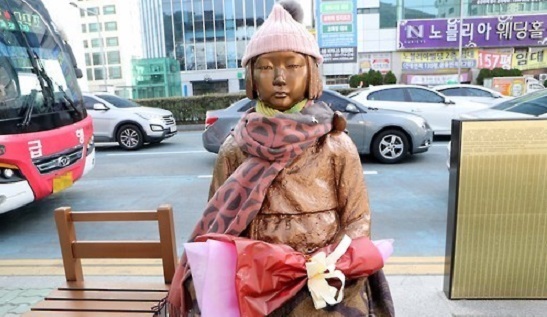South Korea's foreign ministry said Tuesday that it is reviewing a UN panel's recent recommendation that a 2015 deal reached with Japan on its wartime sexual slavery be modified to sufficiently help and support the victims.
South Korea and Japan agreed to the deal in December 2015 under which Tokyo provided 1 billion yen ($9.1 million) to support the lives of South Korean victims. Critics, however, have accused it of lacking any prior consultation with the victims, as well as Japan's sincere apology and acknowledgment of its legal responsibility.
 |
A statue of a girl symbolizing former Korean sex slaves for Japanese soldiers during World War II is seen wearing a scarf and a woolen hat in front of the Japanese Consulate in the southern South Korean port city of Busan on Jan. 7, 2017. (Yonhap) |
On Friday, the UN Committee against Torture said that the deal is not enough to help the victims, calling on the two sides to revise the deal to "ensure that the surviving victims of sexual slavery during World War II are provided with redress, including the right to compensation and rehabilitation and the right to truth, reparation and assurances of non-repetitions."
"We bear in mind (the UN panel's recommendation)," Cho June-hyuck, foreign ministry spokesman, told a regular press briefing. "Relevant ministries and agencies are currently reviewing what was recommended."
Calls for renegotiating or scrapping the deal have been growing in South Korea especially since President Moon Jae-in was sworn in last week. On the campaign trail, Moon had promised to seek a renegotiation of the agreement that his impeached predecessor Park Geun-hye reached with Japan.
In his telephone conversation with Japanese Prime Minister Shinzo Abe on Thursday, Moon said that most South Korean people cannot accept the sexual slavery agreement, hinting that his government might be seeking to renegotiate the controversial deal.
Japan remains adamant that the deal should be respected.
Japan's wartime sexual slavery of Korean women has been a thorny issue between the two Asian neighbors. Historians estimate that up to 200,000 women, mostly from Korea, were forced to work in front-line brothels for Japanese troops during World War II. Around 40 surviving South Korean victims are mostly in their late 80s. (Yonhap)





![[Exclusive] Hyundai Mobis eyes closer ties with BYD](http://res.heraldm.com/phpwas/restmb_idxmake.php?idx=644&simg=/content/image/2024/11/25/20241125050044_0.jpg)
![[Herald Review] 'Gangnam B-Side' combines social realism with masterful suspense, performance](http://res.heraldm.com/phpwas/restmb_idxmake.php?idx=644&simg=/content/image/2024/11/25/20241125050072_0.jpg)

